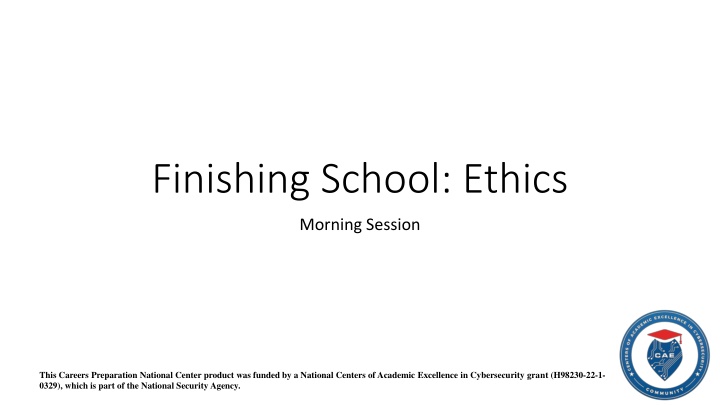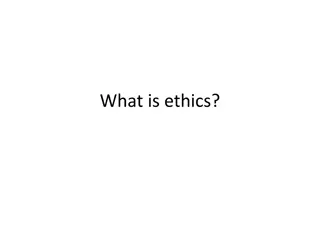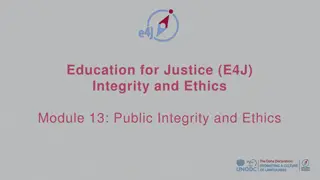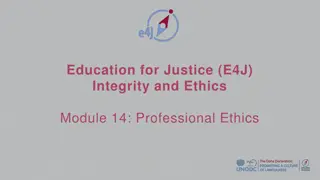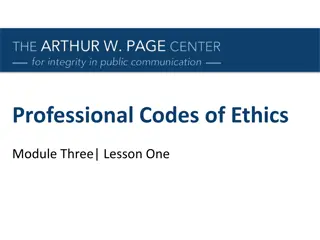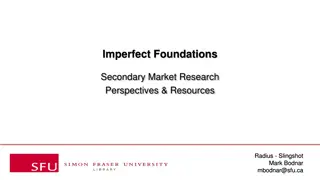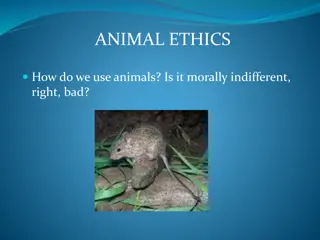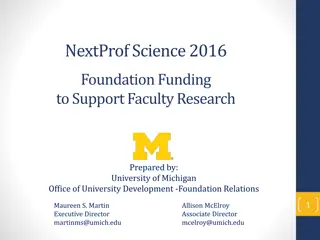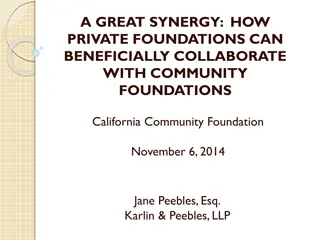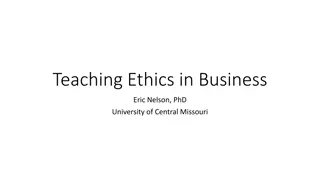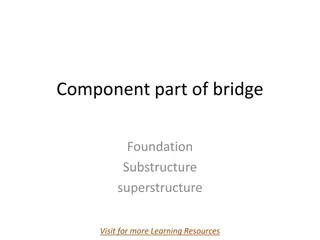Ethics: Understanding the Foundations and Perspectives
Delve into the intriguing realm of ethics, examining the core principles that govern human behavior, distinguishing between ethics, morals, and values, and exploring various perspectives on ethical decision-making. Discover how individuals' views on ethics evolve over time and reflect on the catalysts for such transformations.
Uploaded on Sep 15, 2024 | 0 Views
Download Presentation

Please find below an Image/Link to download the presentation.
The content on the website is provided AS IS for your information and personal use only. It may not be sold, licensed, or shared on other websites without obtaining consent from the author.If you encounter any issues during the download, it is possible that the publisher has removed the file from their server.
You are allowed to download the files provided on this website for personal or commercial use, subject to the condition that they are used lawfully. All files are the property of their respective owners.
The content on the website is provided AS IS for your information and personal use only. It may not be sold, licensed, or shared on other websites without obtaining consent from the author.
E N D
Presentation Transcript
Finishing School: Ethics Morning Session This Careers Preparation National Center product was funded by a National Centers of Academic Excellence in Cybersecurity grant (H98230-22-1- 0329), which is part of the National Security Agency.
Welcome We are so glad you are here! I am [Instructor Name] Credentials Fun/icebreaker info Finishing School is not like a traditional school There are not grades & assignments There are way more involved discussions, researching in small groups, and focus on finalizing what you already have in you Ethics, Professionalism, Resume, & Interviewing At a deeper level
Understanding Ethics Per Oxford, moral principles that govern a person s behavior or the conducting of an activity. Per Canada, Ethics examines the rational justification for our moral judgements. We may agree or disagree with definitions as ethics is a unique thing that exists personally and within almost every framework we interact with At it s core, ethics can be defined as a system of moral principles that helps guide human behavior.
Ethics vs Morals & Values While closely related has different meanings: Ethics Rules or guidelines Typically set by social groups or culture as well as rules and laws Rights & Wrongs More systematic A collective set of standards that a majority agrees on Morals Usually more personal & individual beliefs about what is right and wrong Typically based more on religious, cultural, and philosophical principles Morals usually describe personal convictions. Influenced by one s upbringing, culture, & personal experiences Values Often described as deeply held beliefs that guide our behavior and decision- making. Principles that may form the basis of our morals and ethical decisions Values are often described as honesty, integrity, stewardship
Perspectives on Ethics Virtue/Character Ethics Good people make good moral choices Plato Rule/Deontological ethics Following good rules enables us to make good moral choices Marcus Aurelius Consequentialist/Teleological Ethics (Utilitarian) Good results make moral choices good Thomas Hobbes
Maybe were born with it? Not in the way we describe ethics as a system of rights and wrongs. It is something that changes over time Think back to your early years what has changed in your thinking of ethics? What was the catalyst for the change? However, the debate is still there The jury is out on how some our basic inclinations (think your earliest feeling of fairness or something being resolved fairly) develop But this differs from what we define as our (developed) ethics Indeed it is
Nature vs. Nurture Why are we talking about this? Understanding ethics isn t just about reflecting on yourself. It s about understanding those around you from your bosses to your coworkers Nature That which is innate Born with it Nurture That which influences us Our environment Physical & Virtual
Ethical Developments Developing ethics is a lifelong commitment It requires reflection Grit Determination Tough conversations Personal ethics influences our professionalism Which is why we are starting with it here Take a moment, reflect on your own ethics and how that may have developed
Shaping Ethics Today Question: Did you notice a difference in your understanding of ethics then to now? Do you think more about ethics today? Arguably, we think more about ethics today individually than we did in previous years We see this in how we apply our own personal ethics, morals, and values to businesses and corporations We also see it in how social media influences our own personal ethics, morals, and values As well as seeking out those who share our views
Self-Reflection & Reasoning Our ethics are identified through self-reflection The meeting of our actions, beliefs and motivations with our personal moral principles Self-reflection may not be easy But that is good Through reflection we can begin reasoning and understanding Motivations behind things Intentions, that may look bad but be good It is important for us to go through it so we can understand others The benefits play out over time
Personal Values & Beliefs Take time to identify 5 personal values & 5 beliefs. Write them down no need to say them out loud Looking at what you wrote down, write a short ethical statement Sample Ethical Statement: "I pledge to act with honesty, respect others, make fair decisions, and be accountable for my actions, always aiming to positively impact my community."
Case Study on Ethical Dilemma Take a look at case study: Cheating: Atlanta s School Scandal Read over it and let s talk about it as a group, feel free to research it more while you wait.
Lifelong Learning & Ethical Standards As mentioned, ethics is a lifelong commitment Think about how you can continue to develop your ethics These becomes standards: Honesty Integrity Fairness Respect Responsibility Confidentiality Stewardship
Education, Family & Experiences Education plays a role in helping to develop ethics Such as reading great works Family, as mentioned in Nurture vs Nature, plays a role as well We develop our ethics around those we love Our experiences are a huge influence on our ethics Good or bad
Critical Thinking & Decision Making Critical thinking is the process of analyzing information to make highly effective decisions. Sidenote: I was told it was thinking about your thinking to make your thinking better and I love that definition. It is a skill that requires constant training Sharpens the more it is used This helps immensely with our decision making and is an employable skill
Ethics in the Workplace: Case Study Let s take a look at this case study on ethics in the workplace: The Costco Model Read over it and let s talk about it as a group, feel free to research it more while you wait.
Ethical Leadership Not just for your boss, but for you as well Ethical leadership is more than just displaying ethical characteristics we discussed. It is also building relationships with others It s about displaying ethics within the relationships When challenges arise people may look to you It has a profound impact on the workplace
Ethical Culture Workplace culture cannot be ethical without ethical employees Ethical culture is formed from ethical leadership Still not talking about your boss Leadership in small groups and teams Leadership in projects Leadership in challenges When a workplace is ethical, trust is easier to develop which impacts satisfaction.
Activity: Ethics The Balancing Act Revisit the Costco Model Case Study With what we just covered, how does your view on the study change? What caused your change in thought?
Conclusion/Summary Ethics is not something that is just given We aren t necessarily born with it But it is important for us to understand our own ethics first, to better connect and understand those around us These things transfer well into the workplace and can even influence the workplace culture Leading to a more enjoyable experience for everyone But it starts with us
Finishing School: Professionalism Afternoon Session
Welcome Back We hope your lunch went well! Glad to have you back! Did you think about ethics at lunch? Any interesting discussions or thoughts anyone wants to share? Let s dive into professionalism!
What is Professionalism? Per Merriam-Webster, the conduct, aims, or qualities that characterize or mark a profession or a professional person Per LinkedIn, Professionalism is a way of thinking, behaving, and appearing that demonstrates a commitment to excellence in all aspects of one's work. We are called professionals but do we really practice professionalism? It relates to your ethics more than you think
Defining Professionalism in Various Contexts Workplace Professionalism how you display your behavior, attitude, and level of skills in the workplace. Academic Professionalism professionalism in academia, calls for intellectual honesty, integrity in work, and respect for others ideas. Sporting Professionalism professionalism in sports is sportsmanship, respect for rules, teammates and even the officials. Maintaining a positive attitude winning or losing. Customer Service Professionalism Treating others with respect, listening to needs, being courteous and efficient. Even when the customer is well, not.
Characteristics of Professionalism These may sound like skills or attributes. Especially to athletes (you can relate these skills to the workplace!) They are: Competence Respectfulness Professional Appearance Effective Communication Self-Regulation Continuous Learning Teamwork
The Importance of Professionalism Professionalism isn t only for you It s for the environment It s for your coworkers It s for your managers, supervisors & bosses It s for your customer It sends a signal of trustworthiness, dependability, confidence, and pride in your work. Professionalism plays a huge role in career growth
Developing Professional Skills & Attitudes Like ethics, developing professional skills requires dedication Preferably, lifelong! Athletes, you have a bit of a head start on this. You just need to translate it to other parts of your life. We all already have these skills and attributes We just need to practice it a bit more Attitude is another one that we have to be sure we work on It can make or break future plans
Continuous Learning & The Role of Education Continuous Learning is a must for a professional and for developing professionalism Education can help make that process easy BUT, this isn t an attempt for you to go back to college Use your resources, take advantage of online resources, classes that can be taken at community colleges Learn new skills outside of your job role, be versatile You never know how it will pay off, even if it s just having a new skill Enjoy what you learn, you ll enjoy what you do
Mentorship & Role Models in Professional Development Mentorships can be a great way to develop professionally They can be role models that you work alongside or under. Obtaining mentorships falls on the mentee (that s you) There are a few ways to get a mentor, let s discuss 2: It is your responsibility to build the relationship with whoever it is you want to be your mentor after researching and learning more about them. This helps especially if you aren t one to be so straightforward; or if you know that it may negatively impact your relationship with them Once a good foundation is established, then respectfully ask them to be a mentor to you. Explain your interest, be brief but respectful, why you think they could be right for you and be ready to answer questions they may have.
Mentorship & Role Models in Professional Development The other method comes from LinkedIn: 1. Reflect on whether mentorship is the right fit 2. Identify your mentorship needs 3. Consider people you admire 4. Start with your network 5. Explore other options for finding a mentor 6. Prepare your elevator pitch 7. Request a meeting with them 8. Explain your interest
Professional Conduct When in the workplace, professional conduct is a must. Typically there is either an employee conduct policy or an employee handbook/manual It is important to know what is expected of you within the workplace, not just job tasks but actual conduct Professional conduct is important for a professional environment. It is present in an ethical workplace culture At it s core professional conduct are the traits we ve defined, being shown to those you encounter
Communication Skills & Professionalism Communication is a critically important skill Not just verbally, but electronically and written Effective workplace communication helps maintain not just a quality work environment but also relationships with coworkers. It helps to build trust and understanding between members as well as managers. Communication isn t just about speaking, it is about listening and ensuring others are being heard. These are the skills that help you standout!
Time Management & Responsibility Time Management is a must! Professionalism is about respecting others and that includes their time, with the expectation that they will respect yours. Use your calendars, use your alarms. A Master Calendar helps keep dates and appointments both personal and business in line It helps hold yourself and others responsible. It helps build a reputation of dependability within the workplace.
Integrity, and its friend Ethics Integrity the quality of being honest and having strong moral principles. It goes hand in hand with ethics, which goes hand in hand with professionalism Again, this builds a reputation of being dependable. Honest Reliable These are the traits that will take you far into your career So practice them now!
Professionalism & You Take some time identify some of your own professional traits Write them down Then write down how you identified them Did someone call you honest? Have you been consistently going to the gym? Even when you don t want to You can see professionalism is you You just need to translate them into the workplace
Consistency & Reliability It is actually quite easy to translate these skills. Start by being consistent. Start small, show up to your appointments, classes, work on time. Aim for a 5 minute early time zone. Plan your route s early Prepare your clothes the night before Prepare your breakfast and/or lunch the night before Work on being reliable. Don t wait last minute to contribute. Be one of the first to volunteer, when you truly mean it Try to get your work in early, you ll find it pays off in the long run
Lifelong Commitment Then turn it into a lifelong commitment You may start to see positive benefits in your personal life. Note, this is different from bringing your work home Part of professionalism is having a healthy work-life balance It is knowing when to enjoy life as well as when to work Professionalism is an agreement with an organization and the people within it So be sure to still have a personal life
Professional Growth Professionalism can help lead to professional growth. Recall looking at the types of professionalism in various contexts Professionalism is not about remaining stagnant in a job As you grow your skills, you may want to seek to grow within your career Find something you enjoy, build your skill in it Research how you could use that skill on your career path Work towards that goal by showcasing it Gain certifications, participate in things that will allow you to exercise that skill
Conclusion/Summary Professionalism & ethics have a strong relationship Which has a strong impact on how we operate in our personal and professional life But these traits are not a given, we may not be born with them But that s okay We have an understanding of them We know how we can identify, sharpen, and exhibit them It is a lifelong commitment
Wrapping Up Day 1! Thank you for attending Day 1, we hope you enjoyed it! We look forward to having you back for Day 2, same time Where we will be going over: Resumes Interviewing We hope that you ll reflect on what we went over today and we encourage you to keep a copy See you tomorrow!
